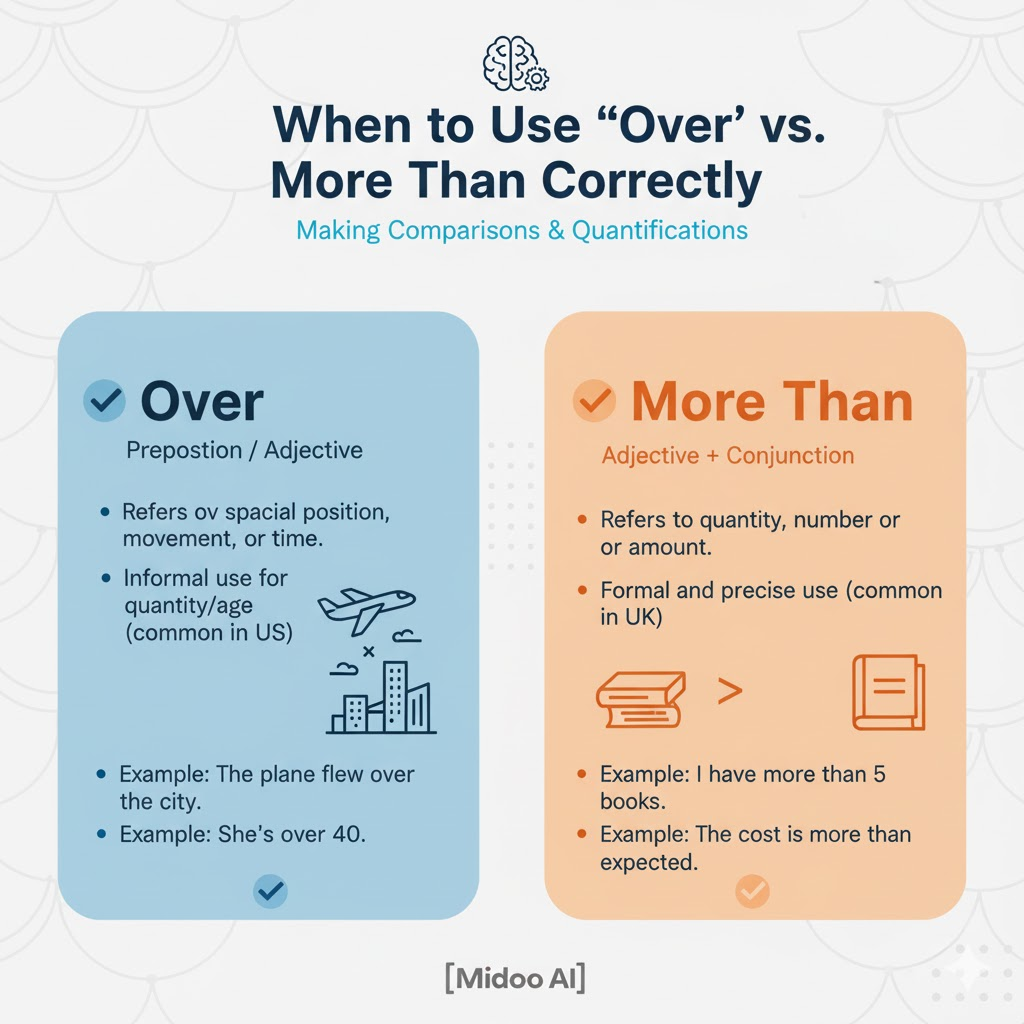When to Use Over vs. More Than

Have you ever wondered whether to say “over 100 people” or “more than 100 people”? If you’ve paused mid-sentence trying to decide, you’re not alone.
At Midoo AI, we often see learners—and even native speakers—get confused about when to use “over” and “more than.” These two phrases can sound similar, but historically, grammar guides have treated them differently. Let’s break down what’s correct today, where the rule came from, and how to sound natural every time.
The Short Answer
✅ Both “over” and “more than” are correct when comparing numbers or amounts.
That means you can say either:
- Over 200 students joined the class.
- More than 200 students joined the class.
Both are perfectly fine in modern English.
However, traditional grammar rules used to draw a distinction—which we’ll explain next.
The Traditional Rule
In older grammar guides (and still taught in some schools), there was a rule that said:
- Use “over” for physical position or movement.
- Use “more than” for numerical comparisons.
Examples (Traditional Style):
- ✅ The plane flew over the mountain. (physical position)
- ✅ More than 100 people attended. (number)
But here’s the truth: this rule is outdated. Even dictionaries like Merriam-Webster and style guides such as the Associated Press (AP) now accept “over” for quantities too.
The Modern Rule (Accepted Usage Today)
Today, “over” and “more than” can both be used for numbers, amounts, or comparisons.
✅ Examples:
- There were over 1,000 downloads on the first day.
- The report found more than 60% of users prefer AI tutors.
- He spent over $500 on his new laptop.
- The restaurant serves more than 30 dishes from around the world.
In all these cases, over and more than are interchangeable.
💡 Tip from Midoo AI:
When writing casually, “over” sounds shorter and smoother.
When writing formally, “more than” feels slightly clearer and more traditional.
When “Over” Works Better
“Over” is more natural when describing movement, position, or control—not just numbers.
✅ Examples:
- The bird flew over the lake.
- The teacher looked over the class.
- She has authority over the team.
🧠 Tip: Use “over” when something is above, covering, or in charge of something else.
When “More Than” Works Better
“More than” fits best when comparing qualities, amounts, or preferences—especially when numbers aren’t literal.
✅ Examples:
- He’s more than just a friend.
- This job is more than I expected.
- The film was more than entertaining—it was inspiring.
🧠 Tip: Use “more than” when emphasizing comparison or degree, not location.
Quick Comparison Table
| Situation | Use “Over” | Use “More Than” | Example |
|---|---|---|---|
| Numbers / quantities | ✅ | ✅ | Over / More than 500 people joined. |
| Movement / position | ✅ | ❌ | The cat jumped over the fence. |
| Comparisons (quality or feeling) | ❌ | ✅ | She’s more than happy to help. |
| Authority / control | ✅ | ❌ | He has control over the project. |
Common Mistakes to Avoid
❌ Incorrect: More than the bridge, the bird flew.
✅ Correct: The bird flew over the bridge.
❌ Incorrect: He has power more than the others.
✅ Correct: He has power over the others.
💡 Tip from Midoo AI:
If you can replace the phrase with “above” or “across,” use over.
If you can replace it with “greater than,” use more than.
Real-Life Examples
- Modern Writing (Accepted):
- Over 10 million people use Midoo AI to improve their English.
- More than 500 reviews mention its pronunciation feedback feature.
- Traditional Writing (Formal):
- More than 200 students completed the course this week.
- The plane flew over the ocean before landing.
You can see how both versions work naturally depending on context.
Memory Trick
✨ Over = Above / Covering
✨ More Than = Greater / Comparing
Think of it this way:
“Over” relates to space, while “more than” relates to amount—but they overlap when talking about numbers.
FAQS
Q1: Is it wrong to say “over 100 people”?
No. That’s perfectly acceptable in both American and British English. Style guides now agree it’s standard English.
Q2: Which is more formal—“over” or “more than”?
“More than” sounds slightly more formal in writing. “Over” feels smoother and more conversational.
Q3: Did the AP Stylebook change its rule?
Yes. In 2014, the Associated Press updated its guidance to allow “over” and “more than” interchangeably for numbers.
Q4: Can I use “over” for money or time?
Absolutely. You can say “over $1,000,” “over two hours,” or “over a week ago.”
Q5: What about British English?
Both “over” and “more than” are common in U.K. English too. The distinction is mostly historical, not regional.